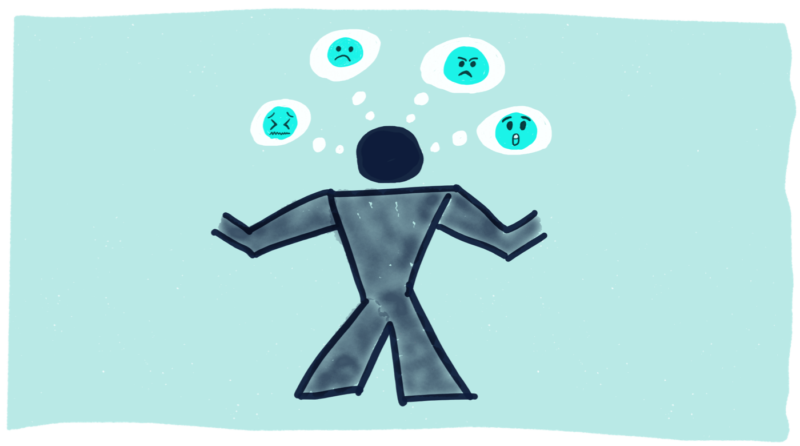We all want to be happier. But figuring out how to actually do it is tricky.
Part of the reason is that we think too much about happiness as a function of more…
- More vacation time
- More money
- More acts of charity
- More meditation
- More time with loved ones
Now, I’m not saying these things won’t lead to greater happiness. Several of them are potentially really great ways to be happier. What I want to point out is that the overall strategy of achieving happiness by doing more can be problematic, especially if it’s your only approach.
For one thing, it can make you feel like you’re never doing enough because there’s always more you could be doing. No sooner have you started doing 10 minutes of mindfulness meditation each day than you see a wellness influencer on Instagram talking about the benefits of at least 30 minutes of mediation per day.
It also quickly gets exhausting and stressful. Even if the things you’re adding to your life are happiness-promoting, there are only so many hours in the day. And the more packed your schedule becomes, the more stressed and overwhelmed you tend to feel.
This is why I like to advocate for the happiness as a function of less approach…
Instead of adding more happiness-promoting things, what if you focused on removing more happiness-depleting things?
Instead of adding a massage appointment each Saturday to de-stress after a long week, what if you stopped checking work email after 6:00 pm?
Both will probably add some happiness. But while the massage takes time (and money) away, the no email after six rule frees up more time!
If you’re with me so far, I want to add one more idea to the mix:
Often the most happiness-depleting things in life happen inside our own minds.
Of course, there are plenty of non-psychological reasons for unhappiness. But frequently you can get the most net happiness for your buck by identifying and reducing psychological factors that are making you unhappy.
What follows are three of the most common psychological reasons why you’re not as happy as you could be. If you can reduce them even by a modest amount, I think the gain in overall happiness will surprise you.
1. Overthinking
“To think too much is a disease.”
― Fyodor Dostoyevsky
The ability to think is a tool. And like any tool, it can be misused just as easily as it can be used well.
Take imagination, for example… Imagination is a form of creative thinking about new possibilities. And it’s hard to argue that the ability to imagine new things doesn’t have huge upside…
- New medicines and surgical techniques that save lives
- New forms of music or literature that inspire and move us
- Newer, safer engineering techniques for cars or airplanes
But as wonderful as imagination can be when directed toward helpful, productive ends, it can be pretty harmful if misused…
- Catastrophizing and imagining worst-case scenarios of being fired and not being able to pay your mortgage because of an innocuous comment your manager made during a meeting.
- Imagining a constant stream of possibilities for why you’re not good enough or unworthy of your partner’s love and affection.
Like any tool, thinking can be used well or poorly.
And if you’re not as happy as you would like to be, there’s a good chance that some form of overthinking is playing a big role.
The reason is pretty straightforward:
- How we think determines how we feel.
- If your thinking is excessively negative, critical, and unhelpful, you’re going to feel excessively bad emotionally.
- If you feel bad emotionally on a regular basis, you’re certainly not going to be as happy as you could be.
So, one of the best ways to improve your overall happiness is to identify and correct patterns of overthinking in your life.
Here are three of the most common types of overthinking:
- Worry. Worry is unhelpful negative thinking about the future. When you’re in the habit of chronic worry, you will end up feeling chronically anxious.
- Rumination. Rumination is unhelpful negative thinking about the past. When you dwell on negatives in the past, excessive anger and depression are often the result.
- Self-criticism. Being overly hard on yourself after a mistake or failure. Unfortunately, a lot of people believe that they need to be self-critical to stay motivated. Unfortunately, this is not only untrue but also leads to major issues with low self-worth.
Learn More: 10 Simple Ways to Stop Overthinking Everything
2. Overfeeling
“If my hands are fully occupied in holding on to something, I can neither give nor receive.”
— Dorothee Sölle
Emotions are like messengers from your brain. But just because they’re trying to tell you something, doesn’t mean they’re always correct or helpful.
If you’re walking down a hard alley late at night and you hear sudden quick footsteps behind you, you’re probably going to feel at least a little afraid. And in this case, that fear is probably warranted since you’re in a situation where something truly dangerous—even life-threatening could happen.
But let’s say you’re giving a presentation at work and you notice that your boss is looking at their phone instead of paying attention to your presentation. The thought crosses your mind that he’s bored, which makes you feel afraid that he doesn’t think very highly of you. In this case, not only is your fear based on shaky evidence (there could be plenty of reasons he’s on his phone that have nothing to do with you), but even if that is the case, it’s not like your survival is at stake.
What’s more, if you continue to dwell on that incident and elaborate on that feeling of fear, there’s a good chance you make yourself so anxious that it starts becoming a self-fulfilling prophecy—any time your boss is around you become so anxious that you’re not very articulate, can’t express yourself clearly, and generally make an unfavorable impression.
The point is…
Just because your emotions are sometimes helpful is no reason to assume that they always are.
There are plenty of instances where your emotions are either totally misinformed or completely unhelpful because they’re not aligned with your values.
For example:
- You want to ask for a raise. You deserve a raise. But you’re terrified to ask for one. Your emotion of fear is pulling you in one direction and your values are pulling you in another.
- You’re in a heated discussion with your spouse. He makes a sarcastic comment about you. Your anger starts rising and you feel the urge to make a sarcastic comment back—something that’s contrary to your values. Are you going to follow the anger or your values?
Your emotions are always there for a reason. And even if they don’t feel very good or aren’t aligned with your values, that doesn’t mean they’re bad or it’s wrong to have them.
But you always have a choice whether to act on those emotions or not.
When you get in the habit of overfeelling—being too consumed with or obsessed over how you feel emotionally—you can ironically end up feeling much, much worse in the long run.
One of the biggest psychological causes of unhappiness is an unhealthy relationship with your emotions. Often this takes the form of ignoring them completely. But the opposite can be just as problematic—being too trusting or aligned with them.
Think about it like this: Emotions are like a good friend. They’ve always got your best interest at heart and are always eager to help. But sometimes they just give bad advice and aren’t worth continuing to listen to.
Learn More:
- 4 Perfectly Good Reasons to Ignore Your Emotions
- Psychological Skepticism
- Emotional Opportunity Cost
3. Overcommitting
“It takes a great deal of bravery to stand up to our enemies, but just as much to stand up to our friends.”
– J. K. Rowling
It’s hard to be happy when you’re chronically stressed out, overwhelmed, and teetering on the edge of burnout.
And why do we get there? Why do we always feel so stressed and overextended?
Well, there are probably lots of reasons depending on your particular life and circumstances, but I will say this:
I’ve never seen a chronically stressed person who didn’t have serious issues with saying no.
If you can’t say no to people and their requests of you, that means you’re constantly saying yes. And if you’re constantly saying yes to other people’s requests for your time, attention, emotional energy, resources, etc., you’re going to feel constantly stressed, and as a result, kind of unhappy.
Now, just learning to get better at saying no to people sounds simple enough—a little glib, even.
But there’s a good reason why for some people it’s so hard to say no: They’re afraid of how they’ll feel as a result.
If you look closely enough, every excuse for not saying no comes down to avoiding some feeling.
For example:
- If you can’t say no to your mother-in-law’s requests that you always host holiday gatherings, maybe it’s because you’re afraid of her being disappointed in you and you find that intolerable.
- If you have trouble saying no to your best friend when they ask you to play golf every weekend, maybe it’s because you’re afraid of losing your friendship and being alone.
- If you’re afraid to say no to your manager at work when she requests you do extra work, maybe it’s because you’re afraid of her getting angry at you.
In short, not being able to say no almost always comes down to fear of emotions—you’re afraid of how you or someone else is going to feel as a result of your saying no.
And while understandable, this refusal to tolerate painful emotions is leading to a constant stream of stress and overwhelm because you can’t say no to anything.
In short:
- You can become a lot happier if you eliminate your overall stress burden.
- The way to reduce your stress is to start saying no to people more often.
- To start saying no to people, you need to improve your tolerance of painful emotions.
- And the only way to do that is to practice…
So, figure out where in your life you want to start saying no and setting better boundaries, then start small and work your way up.
Learn More:





8 Comments
Add YoursMerry Christmas
Thanks, Bob—same to you!
Love your weekly newsletters! Any chance that you do counseling virtually?
Thank you, Kate! Unfortunately, no I don’t.
Very interesting article. Sometimes I will say no then feel guilty of not helping.
Thanks Ann. This article might be interesting re: guilt: https://nickwignall.com/guilt/
Unfortunately, sometimes there are situations where you can’t say no. Caring for an elderly father as well as a schizophrenic son who live four hours a way from each other, as well as being a part time nurse in a prison. The friend who is juggling this life is doing the best she can.
Good point Kara.